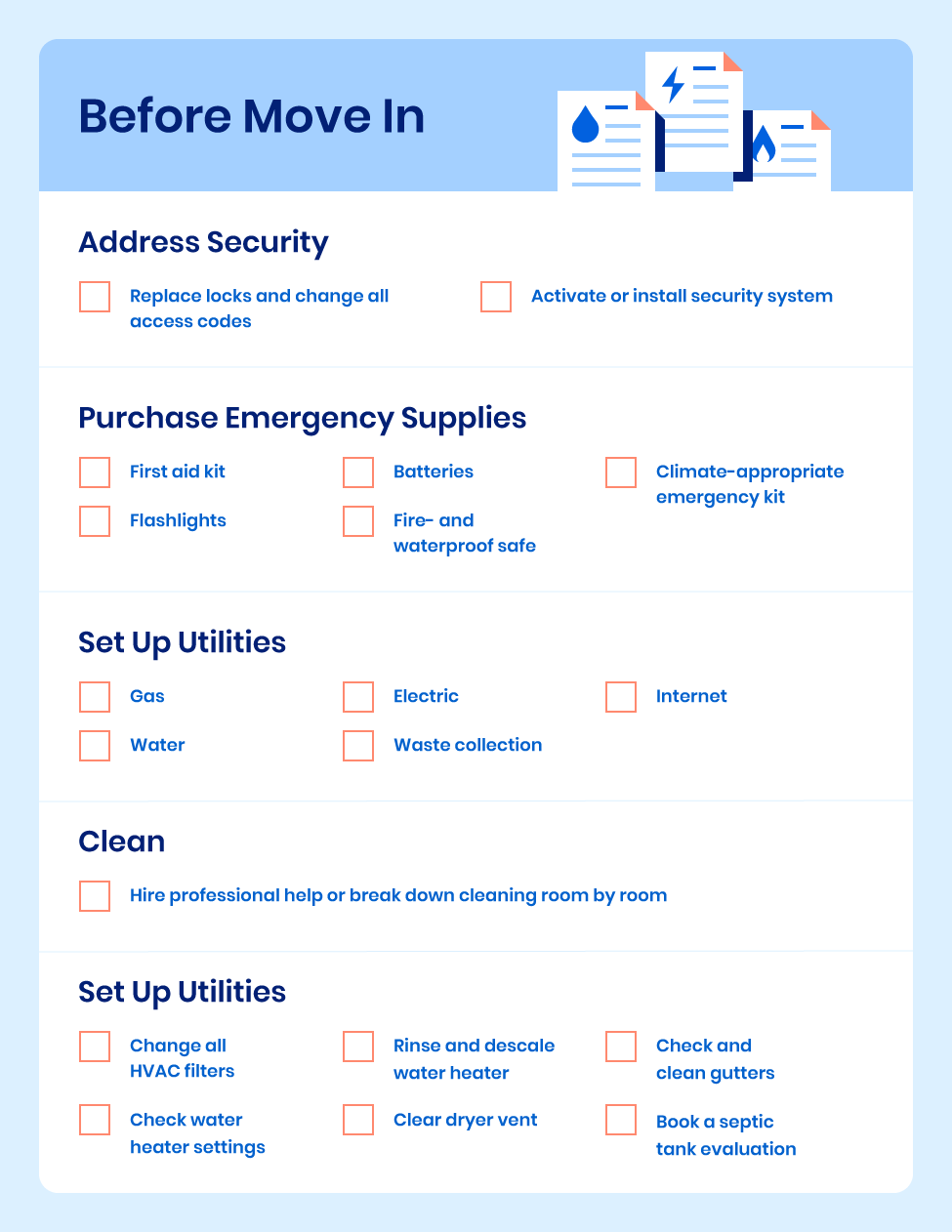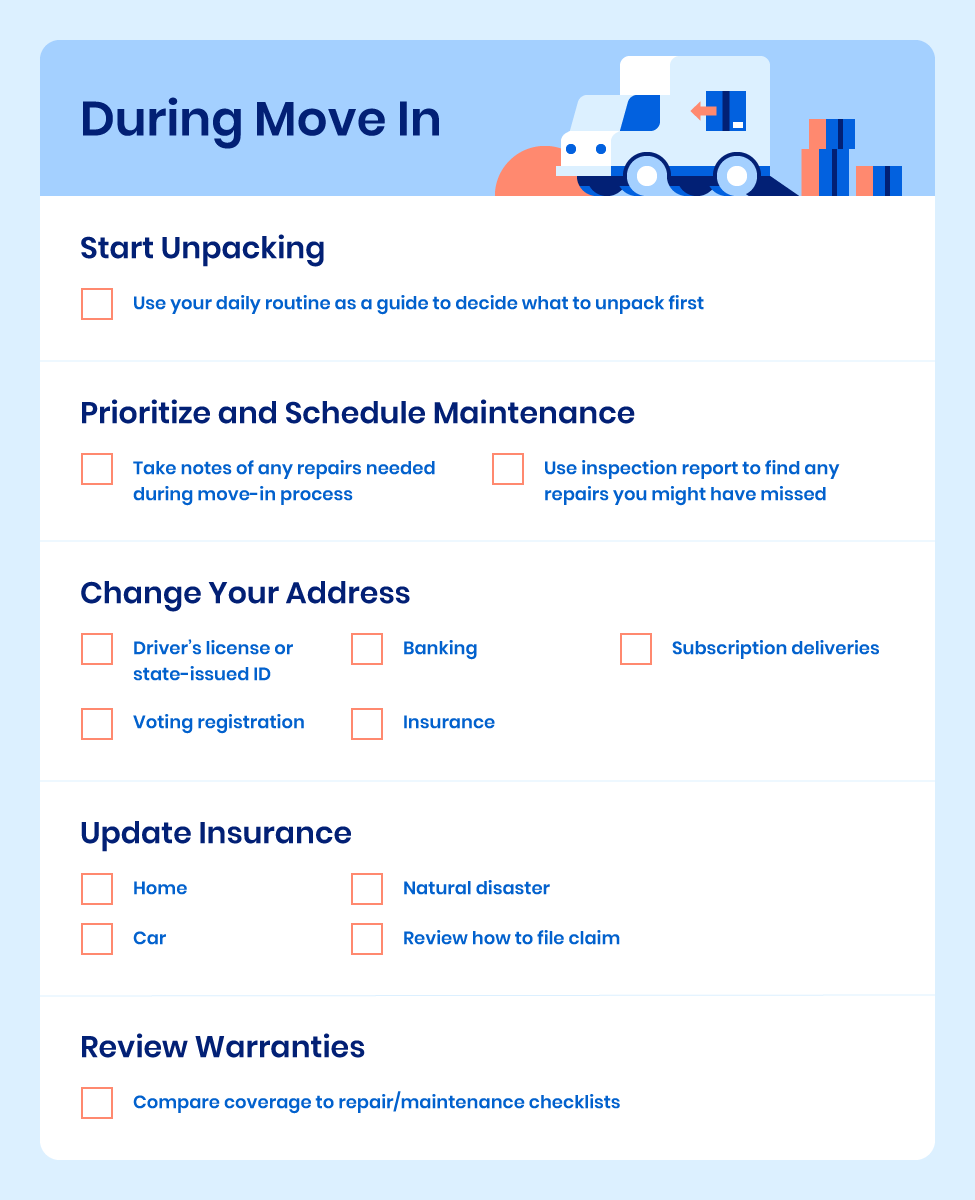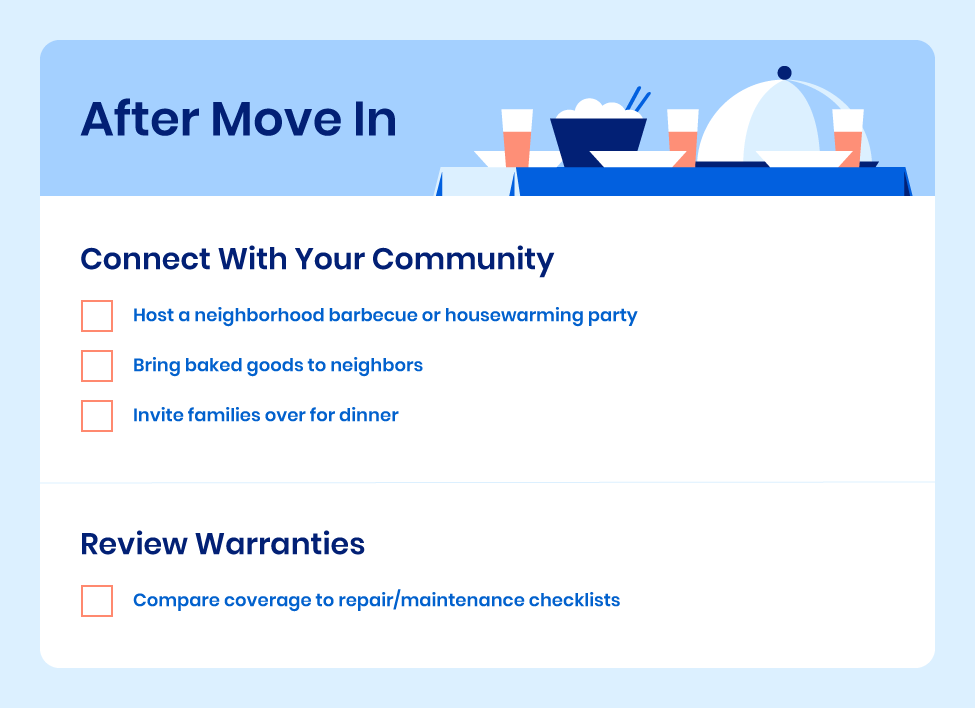What To Do After Buying a House [New Home Checklist]
March 23rd, 2023
![What To Do After Buying a House [New Home Checklist]](/storage/blogposts/March2023/medium/kG6zeJ6UcxXExSD7T3GV.jpg)
Buying a home is one of the most exciting times of your life, especially as a first-time homeowner. But once you’ve signed those papers and your excitement settles, it can feel overwhelming to think about moving to a new place.
As experts in home buying, we’ve put together our tips so you know exactly what to do after buying a house. Follow our checklist and you won’t miss a beat.

1. Address Security
Timing: Before move in
One of the most important things about moving into a new home is ensuring that it’s safe. The first thing you can do is replace the locks and change any access codes. This will ensure only you and your family have access to your new home.
If there’s a security system installed, you can reactivate it as well for some extra peace of mind. This might involve installing a new system, depending on your preferred security provider.
2. Purchase Emergency Supplies
Timing: Before move in
The next step is to cover the basics when it comes to safety inside your home. First, check that your home has the proper number of smoke detectors and carbon monoxide alarms. There should be an alarm in each bedroom, hallway, and at least one on each floor without bedrooms. Replace the batteries and test them to be sure they work. You should also purchase a fire extinguisher for your kitchen and one for each floor of your home.
As you’re taking stock of your smoke and carbon monoxide detectors, locate the circuit box, main water and gas shutoffs, and the sump pump if your home has one. It’s important to know where these are in your home in case of an emergency.
Next, gather some basic safety supplies to keep around. This should include:
-
First aid kit
-
Flashlights
-
Batteries
-
Fire- and waterproof safe for documents
You should also have an emergency kit that’s appropriate based on your local risk. Depending on where you live, this could mean a kit that prepares you for tornadoes, hurricanes, earthquakes, or a combination.
3. Set Up Utilities
Timing: Before move in
There’s nothing worse than thinking you’ve handled it all before a move, flipping a light switch and…nothing happens. As soon as you know when you’re moving in, set up all your utilities, including:
-
Gas
-
Water
-
Electric
-
Waste collection
-
Internet
Not only is this one less thing to worry about when you move in, but it means you won’t need to sacrifice charging your phone or playing some tunes during the move-in process.
4. Clean Your New Home
Timing: Before move in
Ideally, you’ll have the opportunity to deep clean your home before you move boxes in, but we know it’s all too easy to end up trying to clean and unpack at the same time.
If it’s not possible to clean ahead of time, consider hiring a cleaning company to help you tackle your new home. This can be expensive, however, so if you’re not able to pay for a full clean, choose a few rooms you’ll need the most help with, such as the kitchen or bathrooms.
If you’re cleaning everything yourself, plan ahead and pack your boxes by room. This way, you can set everything down in one place, then clean and unpack room by room.
5. Take Stock of Appliances
Timing: Before move in
While owning a home is great, it comes with a bit more responsibility than renting. Don’t overlook checking all your appliances as soon as you can — spotting potential issues early will save you headaches later. To start, check out these maintenance steps people often forget:
-
Change all HVAC filters
-
Check water heater settings
-
Rinse and descale the water heater
-
Clear the dryer vent
-
Check and clean the gutters
-
Book a septic tank evaluation
These steps will start you off on the right foot with taking care of your new home, and will ensure your major appliances stay in good condition.

6. Start Unpacking
Timing: During move in
Now comes the hard part — no one likes unpacking after a big move. If you’re overwhelmed, choosing random boxes to open isn’t going to mitigate that feeling. To get your momentum going, think about what you do in a typical day and unpack what you would use first.
For example, one of the first things you do every day is probably changing out of your pajamas. Unpacking your clothes first makes sense because you’ll be using these items daily.
You can also start with small tasks to get you in the unpacking mood. While it might not make the most sense to stage your bookcase first, the sense of accomplishment of getting something easier done can help you work up to more daunting tasks, like stocking your kitchen.
7. Prioritize and Schedule Maintenance
Timing: During move in
During the move, you might notice small details that need repairs down the line like peeling paint, a chipped tile, or outdated wallpaper. Keep a list handy to write these things down as you notice them so you don’t forget.
You should also check out the inspection report for any repairs you might’ve missed. Once you have your full list of repairs, you can sort them based on whether you can do them yourself or if you need to hire a professional, sort by priority, and start scheduling them out.
8. Change Your Address
Timing: During move in
There’s usually a lot of paperwork involved with moving. Head over to your local post office to set up mail forwarding so you’ll receive any mail sent to your old home before you’re able to switch your address.
Don’t forget to update your address in these key areas:
-
Driver’s license or state-issued ID
-
Voting registration
-
Banking
-
Insurance
-
Subscription deliveries
You should also notify your employer as soon as you can to ensure that they can send you any important documents and update payroll.
9. Update Insurance
Timing: During move in
Now that you’re a homeowner, it’s important to update your insurance policies so your home and belongings are properly covered. Home insurance can cover your home, car, possessions, and more. It also covers you in the event of a natural disaster.
Update your insurance as soon as you move in to make sure you cover any potential gaps. Review your provider’s process for filing claims so you can be prepared if and when the time comes.
10. Review Warranties
Timing: During move in
They’re not required, but home warranties can make it a lot easier to move into a new home, especially if you have unexpected issues with appliances or necessities that aren’t covered by insurance.
Warranties generally cover you for the first year after you move in and can help pay for:
-
Electric repairs
-
Appliance repairs and maintenance
-
HVAC maintenance
-
Plumbing
Some warranties will even cover other costs, such as changing your locks. If you’re nervous about surprise repairs during your first year in your new home, a warranty can help reduce that stress. Review your warranty as soon as possible so you know what’s covered and can take advantage of it.

11. Connect With Your Community
Timing: After move in
After the dust settles and you’ve moved into your home, it’s time to start learning more about your new community. Neighbors are a great resource to get the scoop on your new town, from the best restaurants to the best schools and other community resources. Consider joining your community HOA to meet new people and learn about the community.
Host a neighborhood barbecue or housewarming party to get to know your neighbors. If you’re on the shyer side, invite neighbors over for dinner one at a time or drop off some baked goods to introduce yourself with less pressure.
12. Make Your House a Home
Timing: After move in
The final step after buying a house is most people’s favorite. It’s time to make the space your own and start thinking about cosmetic projects. You’ve covered the necessities already, so now you can look at other projects like painting, redoing floors, or hanging the gallery wall of your dreams.
You can also start thinking about curb appeal. Adding some plants or a fresh coat of paint on your home can go a long way in feeling comfortable and taking pride in your new space.
FAQ
Whether you’ve found your next home or are just beginning your search, here are some answers to your top questions about what to do after buying a house.
What should I do immediately after closing on a house?
As soon as you close on a house, you should change the locks, make sure you have a safe place to store important documents, and schedule necessary maintenance and repairs.
What shouldn’t I do after closing on a house?
After closing on a house it’s important not to make big changes, which can affect your credit score and delay the closing process. This includes switching jobs, closing lines of credit, taking out loans, and more.
What should first-time homeowners know?
Once you’ve closed on your first home, take it slow and schedule out repairs and renovations strategically. It’s easy to go over budget when you’re anxious to get everything done at once.
How long after closing do I get the keys?
The closing process can take up to 50 days depending on the type of loan, and you should be able to pick up your keys on the last day.
Find a Home That Checks All Your Boxes
No matter what stage of the home buying process you’re currently in, we have the expertise and resources to help you navigate what to do after buying a house. Get in touch with UpHomes to start your home buying journey on the right foot.

Ryan Fitzgerald
Hi there! My name is Ryan Fitzgerald, and I am a REALTOR®. My goal is to help you learn more about real estate through our Real Estate Blog! Hopefully, you enjoyed the above blog post and it found a way to provide help or value to you. When you're ready to buy or sell a home of your own let us know here. Please feel free to join the conversation by dropping us a comment below.

